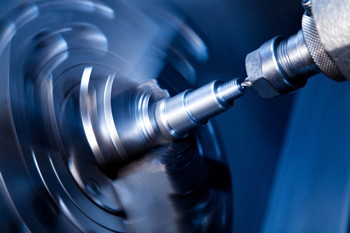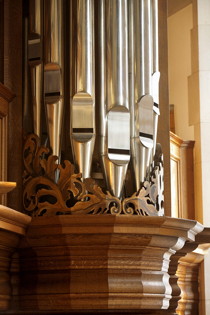WORTH SUPPORTING
You can make it happen: Summer 2014
Tear down this wall!
The number of students using the materials science and engineering labs is terrific, but the space has become outdated and seriously cramped. Help buy new laptops, desktops and software, from $5,000; lab equipment starting at $6,000; and improvements to make the space more efficient and user-friendly, starting at $500.
There's no substitute for real practice, hands-on know-how

Lathe and milling work detail. Photo: Liuhsihsiang. See larger image
Putting design into action is the core of student project teams that create, build and assemble devices: cars, robots, planes, subs, even houses. The Emerson Manufacturing Teaching Lab is where many students learn to turn raw materials into working parts. Milling, lathe work, welding and computer numerically controlled (CNC) skills are taught and put to use in the shop. The demand for CNC milling has so increased that it has become a design constraint for the program. Purchase a new CNC machine: $100,000.
Donate energy auditing training
Help educate the next energy efficiency trendsetters. Thirty students in Cornell's Green Revolving Fund Class are seeking to attain Building Performance Institute (BPI) certification. The training will be used to conduct energy audits of Cornell's campus and identify opportunities for energy savings. Sponsor five students: $7,500.
Grow a career
Every summer, 10 Cornell student interns get to dig into a hands-on work experience at Cornell Plantations. Applications are encouraged from majors in horticulture, landscape architecture and the environmental sciences or from any student who wants to learn about plants and help people connect with nature. Interns are mentored by professional staff and paid full time for 12 weeks from late May to early August. Fully fund one Plantations internship: $5,000 (or support the program with a gift at any amount).
Adopt an elephant

Elephants. Photo: Malin Kihlstrm. See larger image
Elephants are disappearing almost before our eyes, but there is still a chance to keep them roaming the Earth for future generations. Support Cornell's Elephant Listening Project with a symbolic adoption of an elephant family in Dzanga Bai. You will receive photos of your elephant family, videos, biographies and fact sheets: $50-$250.
Challenge the Class of 2015 with a match
Since 1979, one generous individual or couple has stepped forward to create a challenge match for the Senior Class Gift, spurring classes to greater philanthropic achievement. Be a beacon of hope and an inspiration to a younger generation of Cornellians: $25,000 or more.
Give expertise to poverty fighters
Help further the unique alliance that connects Cornell Atkinson Center research teams with CARE (one of the world's most active humanitarian agencies) on the ground in communities throughout the world, speeding delivery of science-based solutions. Cornell scientists also provide background research to inform CARE positions on policy issues related to international food assistance and relief aid. Fund one project development grant: $10,000.
Help Johnson meet its goal
Be part of the Samuel Curtis Johnson Graduate School of Management's drive to raise $50 million with their "Innovation Challenge." As Nayra Otinkorang, MBA '14, puts it: "I give back because it's a blessing to be able to give back in any form and make a difference."

Pipe organ detail. Photo: University Communications Marketing. See larger image
Pipe up for the 'king of instruments'
Cornell is the home of two massive pipe organs, the nearly 75-year-old Aeolian Skinner Organ in Sage Chapel and the recently constructed 18th-century reproduction Baroque Organ in Anabel Taylor Hall. Both magnificent instruments are used regularly for concerts, classes, weddings and services. Considered the "king of instruments," these leather, wood and metal works of art (there are 1,847 pipes in the Anabel Taylor organ alone!) require regular maintenance to sound as good as they look. $10,000 goes a long way, although any amount helps.
How many Cornellians does it take to change a light bulb?
To save energy and be gentler on resources, the Herbert F. Johnson Museum of Art is transitioning all of its galleries to LEDs. Cost per bulb: $60. Help retrofit the entire first floor for $7,200 (120 bulbs) or the entire second floor for $6,300 (105 bulbs). New bulbs for both floors – an illuminating gift – totals $13,500.
To make a gift, or for more information about these and other giving opportunities, email MakeItHappen@cornell.edu